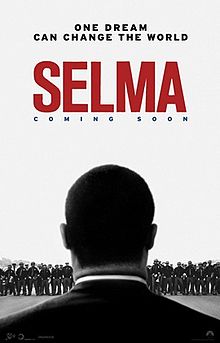
Selma is another one of the most prominent releases of the last year though it kind of got snubbed at the Oscars, winning only for its song Glory and otherwise nominated only for the Best Picture category. I suspect that after 12 Years a Slave won big the year before, the Academy didn’t feel up to showcasing another film about black history in the US. It’s a sign of how far behind we are that though we’re now nearing the end of 2015, we’re still slowly working through the lists of the best movies of last year.
This film is about the Selma to Montgomery marches of 1965, framed around Martin Luthor King as the central figure. King and the Southern Christian Leadership Conference over which he presides decides to make Selma, Alabama the next flashpoint of the civil rights struggle. Despite having a population that is over fifty percent black, less than two percent of the blacks in the city are registered to vote, their attempts to register being frustrated by county clerks who ultimately answer to Governor George Wallace. In order to convince President Lyndon Johnson to propose legislation guaranteeing the right of black citizens to vote unhindered, they decide to organize a five-day long march from Selma to the Alabama state capital of Montgomery, knowing that they would be opposed by troopers and a deputized posse of white volunteers controlled by Selma Sheriff John Clark.
Prior to watching this, I only had the loosest understanding of what went on in Selma or even King’s contribution to the U.S. civil rights movement in general, so this was hugely educational to me. Not only this capture the essentials of what happened, it manages to do so in a highly dramatic way that nevertheless doesn’t feel like propaganda. One way it achieves this is by refraining from making this a one-way hagiography for King. It depicts his powerful and inspirational speeches, yes, as well as his compassion and strength of character. But it also shows that he was a shrewd manipulator of the media and cynically engineered confrontations hoping that the white authorities would make a mistake and overreact so that the movement can win sympathy. Not only that, he was a flawed man and tacitly admits that he had his moments of being unfaithful to his wife who actually the breadwinner of the family. The film also depicts conflict within the civil rights movement itself, especially from local activists who accuse King of using his celebrity-hood to travel around the country to the latest hotspots but never staying long enough to make much of a difference. By being brave enough to admit that King wasn’t a saint, the film actually makes his contributions and achievements feel more real.
The other reason is despite this being director Ava DuVernay’s first big film, it’s a marvelous example of directing. It essentially opens in media res with a depiction of the 16th Street Baptist Church bombing that is both shocking and unforgettable. Its storytelling is efficient, wasting little time with exposition or pauses for dramatic effect, though one problem with this is that it isn’t clear how much time passes between scenes. Historical dramas usually conform to familiar story beats that become nauseating after a while. Selma avoids this problem by being a film that is full of suspense and surprise throughout. Even though you know that the march will eventually be successful, the ultimate moment of triumph still stirs the heart. I especially appreciated how during the final march, the camera cuts away to historical footage of the actual event, as if in homage of the real people who sacrificed and suffered for the struggle.
Reading up on it, I see that the consensus is that it is reasonably accurate with the major objections being over its portrayal of President Johnson. This film shows Johnson only reluctantly agreeing to pass the Voting Rights Act while in reality he worked closely with King to bring about a change in public opinion. It’s a change that tarnishes Johnson’s legacy and was probably made to make the story feel more dramatic. The only other problem I can think of is the huge emphasis this film places on religion. Certainly, it played a huge role in everyone’s motivations but the film suggests that King’s failure to follow through on the second march was inspired by a divine message instead of it being a carefully pre-arranged plan involving King himself, Johnson and even Sheriff Clark.
Still, I think these deviations, though regrettable, are within the bounds of ordinary artistic license. As it stands, Selma is easily one of the best historical dramas I’ve ever watched because it captures the essentials of what happened while still being an amazing film in all other respects. To me, this makes it miles better than 12 Years a Slave which was pretty much a by-the-numbers film that stands out only due to the strength of its historical material.